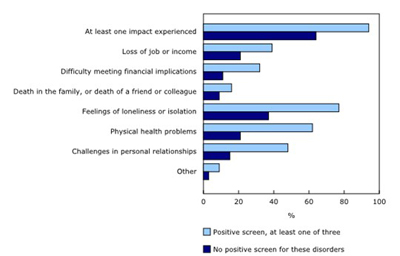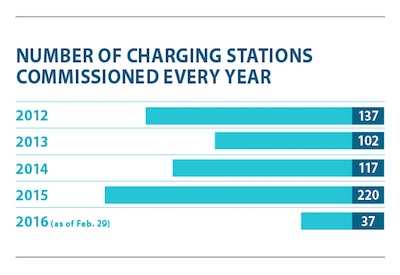Symptoms of mental health disorders over the course of the COVID-19 pandemic

Sept 30, 2021
Chart 1
Proportion of reported impacts due to the COVID-19 pandemic, by positive screen for at least one of the three disorders assessed (major depressive disorder, generalized anxiety disorder, or posttraumatic stress disorder), Canada
Findings released today from the Survey on COVID-19 and Mental Health (SCMH) indicate that one in four (25%) Canadians aged 18 and older screened positive for symptoms of depression, anxiety or posttraumatic stress disorder (PTSD) in spring 2021, up from one in five (21%) in fall 2020. The self-report screening tools are useful to monitor the prevalence of mental health disorder symptoms and probable diagnoses in the population.
A positive screen is not a medical diagnosis and does not always indicate that a disorder is present for an individual. Previously, Statistics Canada released estimates of the prevalence of symptoms of mental health disorders from September to December 2020 (fall 2020), using data from the first cycle of the SCMH. Today, Statistics Canada is releasing findings from the second cycle of the SCMH, collected from February to May 2021 (spring 2021), using a new sample of Canadians. This survey was conducted in collaboration with the Public Health Agency of Canada.
There has been ongoing concern that the pandemic has affected the mental health of Canadians, particularly those who have experienced impacts of the pandemic such as social isolation, job loss, or changes in relationships. Changes in behaviours, thoughts, and feelings can be a normal response to stressful situations, and experiencing symptoms consistent with one or more mental health conditions does not always indicate a disorder. Nevertheless, such symptoms can undermine an individual’s well-being and quality of life and may create a need for mental health supports.
Examining each disorder separately, a greater proportion of Canadian adults screened positive for major depressive disorder in spring 2021 compared with fall 2020 (19% vs. 15%). Similarly, a higher proportion of Canadian adults screened positive for generalized anxiety disorder (15% in spring 2021 vs. 13% in fall 2020). The proportion of Canadians screening positive for PTSD was stable between periods. PTSD is a disorder that may develop in some people after exposure to one or more potentially psychologically traumatic events, which could have occurred at any point in the person’s life. Symptoms of PTSD can develop immediately after the event(s), or they can develop weeks, months or even years later. Changes in the prevalence of symptoms of mental health disorders could require more time to be observed in the statistics.
Symptoms associated with these disorders may have been present before the beginning of the pandemic. For some people who were experiencing mental health problems prior to the pandemic, pre-existing symptoms may have intensified during the pandemic.
Higher proportions of younger adults screened positive for depression and anxiety between fall 2020 and spring 2021
From fall 2020 to spring 2021, higher proportions of adults aged 25 to 64 screened positive for at least one disorder. Among the age group 25 to 44, the proportion screening positive for major depressive disorder increased from 18% in fall 2020 to 23% in spring 2021 and the proportion screening positive for generalized anxiety disorder increased from 15% to 20%. For both time periods, proportions of positive screens for at least one disorder were higher for younger age groups, relative to older groups.
A higher proportion of younger adults reported experiencing negative impacts due to the COVID-19 pandemic
When asked if they had experienced negative impacts due to the COVID-19 pandemic, a higher proportion of younger Canadians reported experiencing at least one of the impacts, such as feelings of loneliness or an increase in physical health problems. In spring 2021, the proportion of Canadians who experienced at least one of these negative impacts due to COVID-19 was 83% for those aged 18 to 24, 80% for those aged 25 to 44, 70% for those aged 45 to 64, and 54% for those aged 65 and older. This pattern was similar to that of fall 2020.
Among Canadians who screened positive for at least one disorder (depression, anxiety or posttraumatic stress disorder), 94% reported being negatively impacted by the pandemic
Previous research suggests that those with mental health disorders are more likely to experience certain adverse events, such as job loss. At the same time, certain experiences may cause mental health symptoms or aggravate existing symptoms. Among Canadians who screened positive for at least one of the three mental health disorders assessed in this survey, 94% reported experiencing one or more impacts related to the COVID-19 pandemic, compared with 64% of Canadians who did not screen positive for any of these three mental health disorders. The most common impacts for both groups were feelings of loneliness or isolation (77% of those whose screened positive for a mental health disorder vs. 37% of those who did not), physical health problems (62% vs. 21%), and challenges in personal relationships (48% vs. 15%). These results highlight that many Canadians experiencing mental health difficulties during the pandemic were also struggling with various stressors.
Source: https://www150.statcan.gc.ca/n1/daily-quotidien/210927/dq210927a-eng.htm











